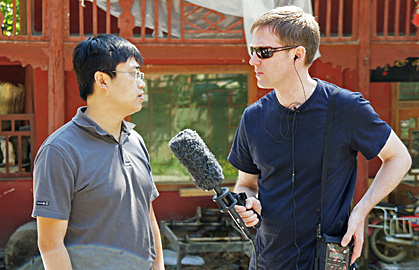Tag: Ethics
Hearing by ethics watchdog could sew up feud in Seattle
Members of a Seattle-based media-watchdog group weighed in March 31 [2012] on a yearlong dispute between an antiabortion group and KUOW, the ...Simple Googling dug up what Daisey had hidden
Within a few hours of phoning the translator who refuted key details in a This American Life show about factories that manufacture Apple products ...New NPR ethics code discourages outside contracts
NPR journalists must seek management approval to sign work contracts with other media outlets, and most such requests will not be granted, ...No-chat zone ’twixt funders and reporters?
Radio news veteran Jim Asendio resigned as news director of Washington’s WAMU-FM last week after an internal dispute over a private fundraising ...Unvetted war story slips past producers
A commentary created through an experimental radio project of the New America Foundation turned a harsh spotlight on the editorial vetting process at Marketplace, ...News leaders draw hard line on employees’ public comments
Update, Nov. 10: The NPR Board postponed considering the ethics policy scheduled for its Nov. 10-11 meeting. Spokesperson Dana Rehm said work ...Simeone to stay on as “World of Opera” host, WDAV to distribute show
NPR is dropping distribution of World of Opera as of Nov. 11. The new distributor will be WDAV Classical Public Radio in Charlotte, N.C., ...Simeone’s activism prompts inquiry into ethical standards for pubradio freelancers
Public radio is once again struggling to define the line between on-air talent who report as ethically bound journalists and those personalities ...After scandal, fundraisers debate ethics
Having witnessed the damaging one-round knockout of NPR fundraiser Ron Schiller in March, public radio’s development pros are working to adapt the ...Editorial integrity panel says the time’s right to think about principles
Now might not seem like the best time for the public broadcasting system to be pondering philosophical questions of identity and purpose, ...Panel to NPR: Rein in punditizing
NPR should have its journalists phase out any long-term contracts for appearances on other media outlets, monitor those appearances more carefully and ...‘Sloppiness,’ not wrongdoing, led to probe, says WNET chair
The leadership of WNET said a federal investigation into the station’s use of federal grants totaling almost $13 million is wrapping up, ...Pharma fees to ‘Infinite Mind’ doctor call attention to conflict-of-interest issues
Bill Lichtenstein, executive producer of pubradio’s The Infinite Mind, got a phone call Nov. 20 from a New York Times reporter with troubling information: the program’s ...Pubradio guide advises broad application of news ethics
A revised ethics guide for public radio asks journalists to "remain reportorial" instead of spouting opinions when they're off the air, and ...Pubradio guide advises broad application of news ethics
A revised ethics guide for public radio asks journalists to “remain reportorial” instead of spouting opinions when they’re off the air, and ...





